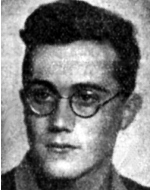Son of Pnina and Yeshayahu, was born on September 21, 1928, in Tel Aviv, where the pace of education in the kindergarten was too slow to develop, and at the age of five, when he knew how to read a newspaper, he was accepted to first grade in school. To get ahead of his classmates all the years, because he always knew from reading more than he could at school The usual remedy for skipping one class was not accepted by his father, considering the boy’s young age. The seventh grade of the high school in Beit Hakerem, and even outside the school was ahead of his age, when he was 9 years old and was introduced to the Scouts organization and found no satisfaction there and moved to Hashomer Hatza’ir. He studied the subject of obedience and discipline, where he found satisfaction in his love of nature and freedom, was interested in mechanical work and at the age of 12 worked during the summer vacation 8 hours In the summer of 1942, at the recommendation of his father (who was then a clerk at the police headquarters), he was hired to work in the police garage and liked the workers (all of them adult Arabs) in his behavior as a real laborer. Al-Alamein). When he was 14 years old, he was accepted to the CHE (with the help of a “white lie” which is already 15 years old), he fulfilled his duties responsibly and received a uniform, but received the certificate only when he was 15. At that age he participated with his graduates in hard- Ein Gedi and the Negev, and added many trips and trips throughout the country in “private operations” (in “Tramp” and “Bargal”), and his photographs and stories delighted his parents and friends. He also traveled extensively with his father. In 1994 he took part in a course for Gadna commanders in the children’s village, and when he returned from there he stopped his municipal studies and was accepted to the Kaduri agricultural school. He was interested in another study in agricultural studies in America, but because of the tense situation in Israel, he decided to join the Palmach and to train the Scouts, and did his training in Geva, Beit Hashita and Ein Gev and completed a course for commanders. He was well-versed in work and watch and knew how to make friends with people across the Syrian border. From the beginning of the War of Independence, he served in the Yiftach Brigade in the defense of the Ein Zeitim, Mount Canaan and Safed areas and took part in the daring and successful raid on Sasa, in sabotage and explosions. He completed a paramedics’ course, but preferred to use firearms. As a lover of music from his childhood (influenced by his father and with his help) he would enjoy his music with a recorder or a harmonica and classical records he had bought for his apprentices, and he would describe the battles in his letters to his brother in musical terms. Descriptions of effort and suffering and struggle with the enemy and the shortages and dangers in his letters turned into humorous episodes of humor. After an “old debt collection” from Ein Zeitun, the village that was to blame for the death of its members, he went with his company from Mount Canaan to Safed to participate in the liberation of the Jewish neighborhood from the siege, where he wrote an envelope: “If I do not come back, open the letter” I had confidence (during the “debt collection” from Ein Zeitun) that I and all my neighbors would remain whole and healthy, but of course we have to prepare for everything. ” “And finally, we are on the verge of liberation, and you will move on, on the corpses of Mustafa and Hassan, without me.” Indeed, a quarter of an hour before the completion of the conquest of the fortress, which ended the liberation of Safed, on Sunday, May 10, 1948, he was severely injured in the back, lying next to the machine gun, and the sense of victory closed his eyes before he knew that the battle he had participated in ended with a brilliant victory and cryingBush is all Safed. He was laid to rest at the military cemetery in Safed.
